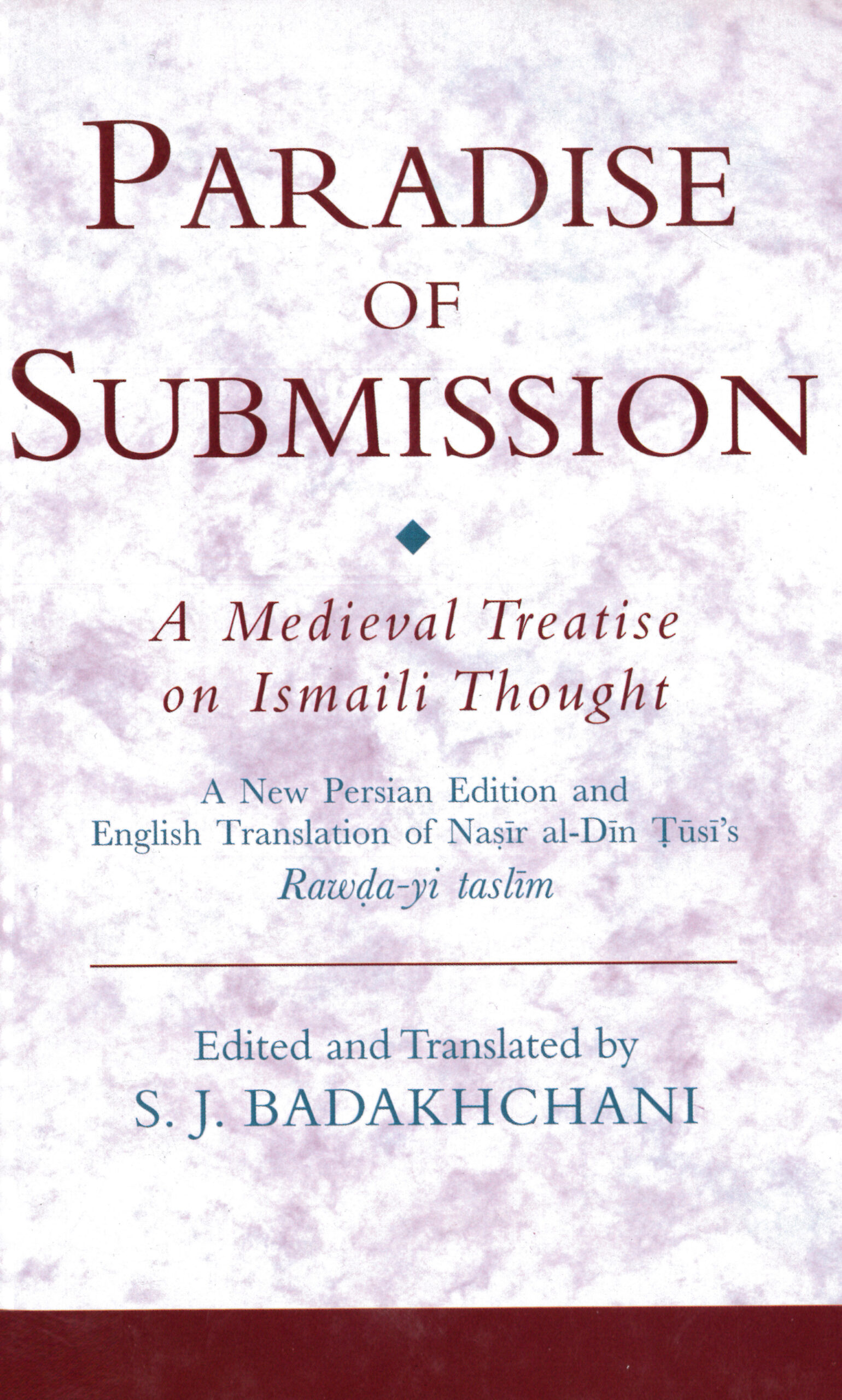Naṣīr al-Dīn Ṭūsī, the renowned Shi‘i scholar of the 13th century, produced a range of writings in different fields of learning under Ismaili patronage and later under the Mongols. This is a new English translation of his Rawda-yi taslīm – the single most important Ismaili text from the AlamutFortress of the Nizari Ismailis in northern Iran, which fell to the Mongols in 654 AH/1256 CE. period. Here the Persian and English texts are published together for the first time to produce a work of enormous value to students of Islamic theology and philosophy. The book contains an introduction by Professor Hermann Landolt and philosophical commentary by Professor Christian Jambet, who has produced a French translation of this text.
Preface
Introduction, by Hermann Landolt
Paradise of Submission (English text)
Taṣawwur 1
Refutation of the argument of one who denies the Creator, the Sublime, the Exalted, or maintains that there are two deities or two eternal beings, and [demonstrating] that human beings cannot establish a proof for His existence [§1–9]
Taṣawwur 2
On the procession of all things from His Almighty and Holy Command, [written] as a catechism [§10–29]
Taṣawwur 3
Concerning the question that ‘Out of one can only issue one’ [§30–36]
Taṣawwur 4
Concerning the First Intellect, the Agent Intellect and the Universal Intellect, being three in expression and one in meaning [§37]
Taṣawwur 5
Concerning the Universal Soul [§38]
Taṣawwur 6
Concerning primordial matter [§39–45]
Taṣawwur 7
Concerning universal nature and the universal body [§46–50]
Taṣawwur 8
Concerning knowledge of the human soul [§51–66]
Taṣawwur 9
Concerning knowledge of the human intellect [§67–77]
Taṣawwur 10
Concerning the purpose of the attachment of individual souls to human bodies, and a short account of the composition of the human body [§78–101]
Taṣawwur 11
Concerning the essential differentia of each genus and the natural kingdom: mineral, plant, animal and human [§102–106]
Taṣawwur 12
Concerning the perfections which the attribute bestows on its subject, and vice-versa, through the permission of God Almighty [§107–109]
Taṣawwur 13
Concerning the categories of knowledge: the necessary, the speculative, the instructional and the inspirational [§110–113]
Taṣawwur 14
Concerning good and evil, that evil does not exist in initial origination, and [explaining the] existence of the evil that is perceived in this world [§114–132]
Taṣawwur 15
Concerning Paradise and paradises, Hell and hells, purgatories and the paths [§133–160]
Taṣawwur 16
Concerning Adam and Iblis [§161–182]
Taṣawwur 17
Concerning the causes for various differences that exist among the world’s inhabitants, and between the followers of truth and the followers of error [§183–207]
Taṣawwur 18
Concerning the paucity of the followers of truth and the great number of the followers of error [§208–214]
Taṣawwur 19
Concerning demons, fairies and angels [§215–220]
Taṣawwur 20
Concerning progression from corporeality to spirituality, and from spirituality to rationality [§221–224]
Taṣawwur 21
Concerning the Origin and the Return, this world and the Hereafter, man’s coming into this world and his departure from it, illustrating whence he has come, why he has come and whither he is heading, and discussing the resurrection of souls and bodies [§225–264]
Taṣawwur 22
On the refinement of character [§265–299]
Taṣawwur 23
Concerning various kinds of submission [§300–316]
Taṣawwur 24
On prophethood and the imamate, where with respect to prophethood are discussed miracles, pseudo-prophets and the possessed, and with respect to the imamate are discussed pupils, teachers and the hujjats [§317–389]
Taṣawwur 25
On the essence of language, the faculties of speech and hearing, and silence [§390–4O1]
Taṣawwur 26
Concerning the cycles of the six Prophets with authority, from Adam to Muhammad – peace be upon them – and the truthful Imams – may their mention be sanctified – and the appearance of the mission of the Resurrector, and the proclamation of the mission of Resurrection [§402–482]
Taṣawwur 27
On idol worshippers and refutation of their doctrines [§483–518]
Annex
On the nature of spiritual union
On the hierarchy of spiritual knowledge
Appendix
A Philosophical Commentary, by Christian Jambet
Notes
Bibliography
Index
Rawda-yi taslīm (Persian text)
‘The translation of the Rawda is smooth-flowing and fastidious … Badakhchani’s ability to render difficult Persian and Arabic constructions into readable English is particularly noteworthy … an important contribution to the growing body of Islamic philosophical texts in English.’
– Mohammad Rustom, The Muslim World Book Review
‘…should most certainly find a home on the shelves of any collection with even a modicum of holdings on Ismaili studies.’
– Erik S. Ohlander, MELA Notes
S. J. Badakhchani is a Research Associate at The Institute of Ismaili Studies in London, having obtained his doctorate in Islamic Philosophy at the University of Oxford in 1989. His previous publications include Contemplation and Action, a new Persian edition and English translation of Naṣīr al-Dīn Ṭūsī’s spiritual autobiography, Sayr wa Sulūk (1998).

